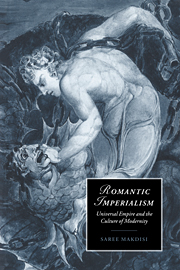Book contents
- Frontmatter
- Contents
- Preface and acknowledgments
- 1 Introduction: Universal Empire
- 2 Home imperial: Wordsworth's London and the spot of time
- 3 Wordsworth and the image of Nature
- 4 Waverley and the cultural politics of dispossession
- 5 Domesticating exoticism: transformations of Britain's Orient, 1785–1835
- 6 Beyond the realm of dreams: Byron, Shelley, and the East
- 7 William Blake and the Universal Empire
- 8 Conclusions
- Notes
- Bibliography
- Index
- CAMBRIDGE STUDIES IN ROMANTICISM
5 - Domesticating exoticism: transformations of Britain's Orient, 1785–1835
Published online by Cambridge University Press: 29 September 2009
- Frontmatter
- Contents
- Preface and acknowledgments
- 1 Introduction: Universal Empire
- 2 Home imperial: Wordsworth's London and the spot of time
- 3 Wordsworth and the image of Nature
- 4 Waverley and the cultural politics of dispossession
- 5 Domesticating exoticism: transformations of Britain's Orient, 1785–1835
- 6 Beyond the realm of dreams: Byron, Shelley, and the East
- 7 William Blake and the Universal Empire
- 8 Conclusions
- Notes
- Bibliography
- Index
- CAMBRIDGE STUDIES IN ROMANTICISM
Summary
The vicinity of China to our Indian territories … must necessarily draw our attention to that most ancient and wonderful Empire, even if we had no commercial intercourse with its more distant and maritime provinces; and the benefits, that might be obtained from a more intimate connexion with a nation long famed for their useful arts, and for the valuable productions of their country, are too apparent to require any proof or illustration.
Sir William Jones, The Second Classical Book of the ChineseSir William Jones, and others, recognized the demand for a code of Indian law; but unhappily thought of no better expedient than that of employing some of the natives themselves; as if one of the most difficult tasks to which the human mind can be applied, a work to which the highest measure of European intelligence is not more than equal, could be expected to be tolerably performed by the unenlightened and perverted intellects of a few Indian pundits.
James Mill, The History of British IndiaThe sea is between us. The mass of that element, which, by appearing to disconnect, unites mankind, is to them a forbidden road. It is a great gulf fixed between you and them, – not so much that elementary gulf, but that gulf which manners, opinions and laws have radicated in the very nature of the people.
- Type
- Chapter
- Information
- Romantic ImperialismUniversal Empire and the Culture of Modernity, pp. 100 - 121Publisher: Cambridge University PressPrint publication year: 1998



